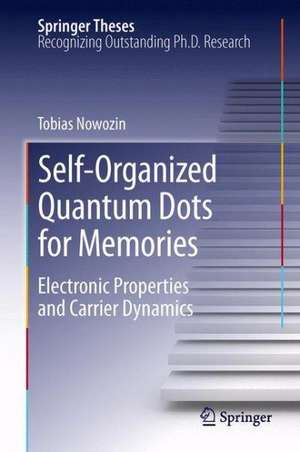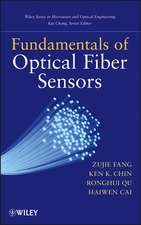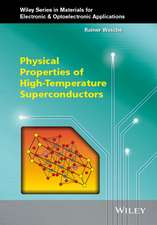Self-Organized Quantum Dots for Memories: Electronic Properties and Carrier Dynamics: Springer Theses
Autor Tobias Nowozinen Limba Engleză Hardback – 15 oct 2013
This thesis investigates the electronic properties of and carrier dynamics in self-organized quantum dots by means of time-resolved capacitance spectroscopy and time-resolved current measurements. The first aim is to study the localization energy of various QD systems in order to assess the potential of increasing the storage time in QDs to non-volatility. Surprisingly, it is found that the major impact of carrier capture cross-sections of QDs is to influence, and at times counterbalance, carrier storage in addition to the localization energy. The second aim is to study the coupling between a layer of self-organized QDs and a two-dimensional hole gas (2DHG), which is relevant for the read-out process in memory systems. The investigation yields the discovery of the many-particle ground states in the QD ensemble. In addition to its technological relevance, the thesis also offers new insights into the fascinating field of nanostructure physics.
| Toate formatele și edițiile | Preț | Express |
|---|---|---|
| Paperback (1) | 634.32 lei 43-57 zile | |
| Springer International Publishing – 27 aug 2016 | 634.32 lei 43-57 zile | |
| Hardback (1) | 639.25 lei 43-57 zile | |
| Springer International Publishing – 15 oct 2013 | 639.25 lei 43-57 zile |
Din seria Springer Theses
- 18%
 Preț: 997.88 lei
Preț: 997.88 lei -
 Preț: 389.88 lei
Preț: 389.88 lei - 15%
 Preț: 646.94 lei
Preț: 646.94 lei - 18%
 Preț: 943.43 lei
Preț: 943.43 lei -
 Preț: 399.29 lei
Preț: 399.29 lei - 18%
 Preț: 944.99 lei
Preț: 944.99 lei - 15%
 Preț: 636.80 lei
Preț: 636.80 lei - 18%
 Preț: 941.05 lei
Preț: 941.05 lei - 15%
 Preț: 643.16 lei
Preț: 643.16 lei - 15%
 Preț: 642.68 lei
Preț: 642.68 lei - 18%
 Preț: 1103.62 lei
Preț: 1103.62 lei - 20%
 Preț: 558.82 lei
Preț: 558.82 lei - 18%
 Preț: 1112.30 lei
Preț: 1112.30 lei - 18%
 Preț: 944.19 lei
Preț: 944.19 lei - 18%
 Preț: 1109.92 lei
Preț: 1109.92 lei - 18%
 Preț: 1217.27 lei
Preț: 1217.27 lei - 15%
 Preț: 640.06 lei
Preț: 640.06 lei - 15%
 Preț: 636.45 lei
Preț: 636.45 lei - 15%
 Preț: 640.06 lei
Preț: 640.06 lei - 15%
 Preț: 640.88 lei
Preț: 640.88 lei -
 Preț: 389.70 lei
Preț: 389.70 lei - 20%
 Preț: 563.89 lei
Preț: 563.89 lei -
 Preț: 393.35 lei
Preț: 393.35 lei - 15%
 Preț: 637.93 lei
Preț: 637.93 lei - 15%
 Preț: 641.85 lei
Preț: 641.85 lei - 18%
 Preț: 1225.94 lei
Preț: 1225.94 lei - 20%
 Preț: 551.36 lei
Preț: 551.36 lei - 18%
 Preț: 1229.10 lei
Preț: 1229.10 lei - 15%
 Preț: 639.25 lei
Preț: 639.25 lei - 18%
 Preț: 999.45 lei
Preț: 999.45 lei - 15%
 Preț: 640.06 lei
Preț: 640.06 lei - 18%
 Preț: 1220.45 lei
Preț: 1220.45 lei - 18%
 Preț: 1116.26 lei
Preț: 1116.26 lei - 18%
 Preț: 1110.72 lei
Preț: 1110.72 lei - 18%
 Preț: 1000.87 lei
Preț: 1000.87 lei - 18%
 Preț: 891.17 lei
Preț: 891.17 lei - 15%
 Preț: 640.06 lei
Preț: 640.06 lei - 5%
 Preț: 1154.07 lei
Preț: 1154.07 lei - 15%
 Preț: 635.96 lei
Preț: 635.96 lei - 15%
 Preț: 640.88 lei
Preț: 640.88 lei -
 Preț: 387.20 lei
Preț: 387.20 lei - 18%
 Preț: 1109.92 lei
Preț: 1109.92 lei -
 Preț: 385.25 lei
Preț: 385.25 lei -
 Preț: 385.25 lei
Preț: 385.25 lei - 18%
 Preț: 1112.30 lei
Preț: 1112.30 lei - 18%
 Preț: 999.45 lei
Preț: 999.45 lei -
 Preț: 386.99 lei
Preț: 386.99 lei - 15%
 Preț: 637.13 lei
Preț: 637.13 lei - 20%
 Preț: 554.20 lei
Preț: 554.20 lei - 20%
 Preț: 555.57 lei
Preț: 555.57 lei
Preț: 639.25 lei
Preț vechi: 752.06 lei
-15% Nou
Puncte Express: 959
Preț estimativ în valută:
122.32€ • 128.04$ • 101.81£
122.32€ • 128.04$ • 101.81£
Carte tipărită la comandă
Livrare economică 31 martie-14 aprilie
Preluare comenzi: 021 569.72.76
Specificații
ISBN-13: 9783319019697
ISBN-10: 3319019694
Pagini: 172
Ilustrații: XVI, 153 p. 91 illus., 9 illus. in color.
Dimensiuni: 155 x 235 x 15 mm
Greutate: 0.39 kg
Ediția:2014
Editura: Springer International Publishing
Colecția Springer
Seria Springer Theses
Locul publicării:Cham, Switzerland
ISBN-10: 3319019694
Pagini: 172
Ilustrații: XVI, 153 p. 91 illus., 9 illus. in color.
Dimensiuni: 155 x 235 x 15 mm
Greutate: 0.39 kg
Ediția:2014
Editura: Springer International Publishing
Colecția Springer
Seria Springer Theses
Locul publicării:Cham, Switzerland
Public țintă
ResearchCuprins
Fundamentals.- Charge carriers in quantum dots.- Coupling of QDs to 2D gases.- Measurement methods.- Electronic properties of and storage times in QDs.- Carrier dynamics in quantum dots coupled to a 2DHG.- Summary and Outlook.- Storage time as a function of the localization energy.- Experimental details - Setup.- Samples.- Sample Processing.- DLTS: Error of graphical analysis.- Extrapolation of storage times.
Textul de pe ultima copertă
Today’s semiconductor memory market is divided between two types of memory: DRAM and Flash. Each has its own advantages and disadvantages. While DRAM is fast but volatile, Flash is non-volatile but slow. A memory system based on self-organized quantum dots (QDs) as storage node could combine the advantages of modern DRAM and Flash, thus merging the latter’s non-volatility with very fast write times.
This thesis investigates the electronic properties of and carrier dynamics in self-organized quantum dots by means of time-resolved capacitance spectroscopy and time-resolved current measurements. The first aim is to study the localization energy of various QD systems in order to assess the potential of increasing the storage time in QDs to non-volatility. Surprisingly, it is found that the major impact of carrier capture cross-sections of QDs is to influence, and at times counterbalance, carrier storage in addition to the localization energy. The second aim is to study the coupling between a layer of self-organized QDs and a two-dimensional hole gas (2DHG), which is relevant for the read-out process in memory systems. The investigation yields the discovery of the many-particle ground states in the QD ensemble. In addition to its technological relevance, the thesis also offers new insights into the fascinating field of nanostructure physics.
This thesis investigates the electronic properties of and carrier dynamics in self-organized quantum dots by means of time-resolved capacitance spectroscopy and time-resolved current measurements. The first aim is to study the localization energy of various QD systems in order to assess the potential of increasing the storage time in QDs to non-volatility. Surprisingly, it is found that the major impact of carrier capture cross-sections of QDs is to influence, and at times counterbalance, carrier storage in addition to the localization energy. The second aim is to study the coupling between a layer of self-organized QDs and a two-dimensional hole gas (2DHG), which is relevant for the read-out process in memory systems. The investigation yields the discovery of the many-particle ground states in the QD ensemble. In addition to its technological relevance, the thesis also offers new insights into the fascinating field of nanostructure physics.
Caracteristici
Nominated as an outstanding Ph.D. thesis by the Technical University of Berlin, Germany Investigates novel heterostructures: GaSb/GaAs, InGaAs/GaP Covers the detection of many-particle hole ground states in QDs Presents a highly innovative memory concept Includes supplementary material: sn.pub/extras







